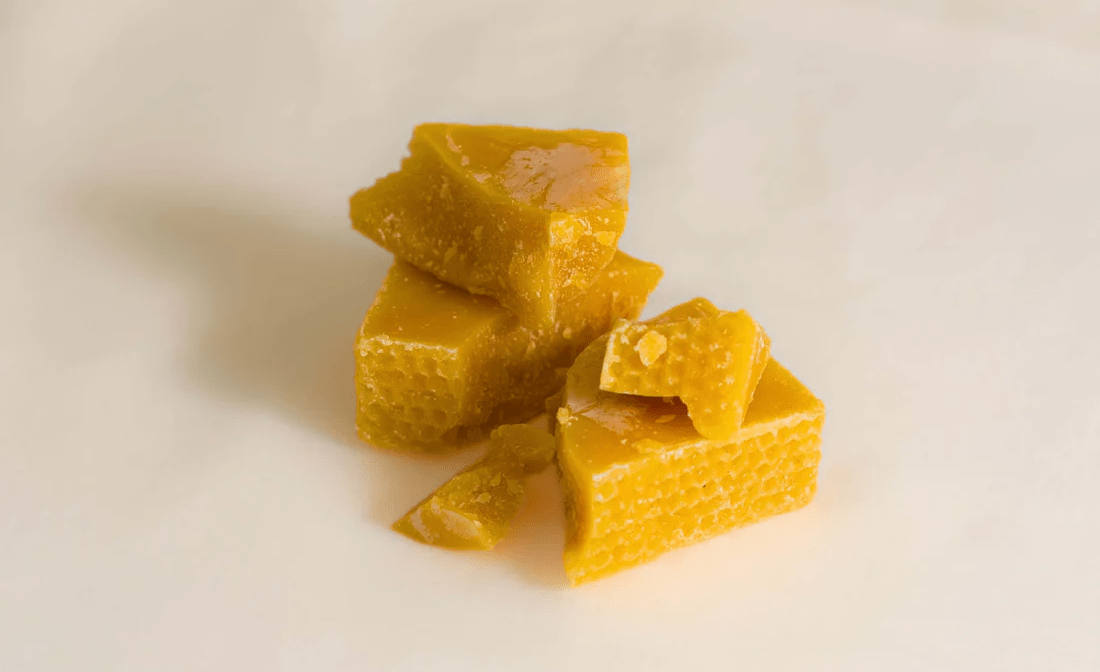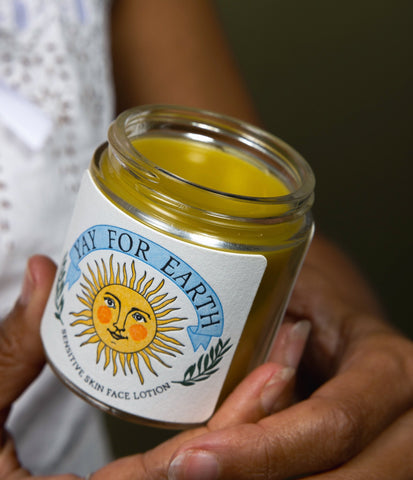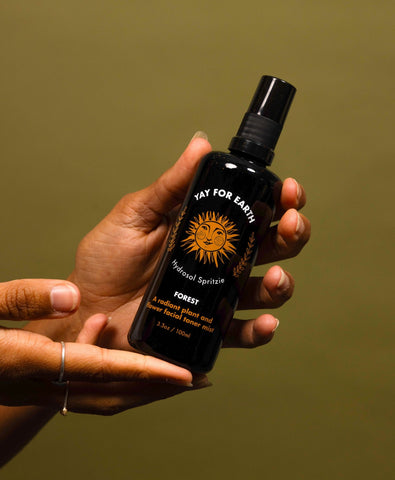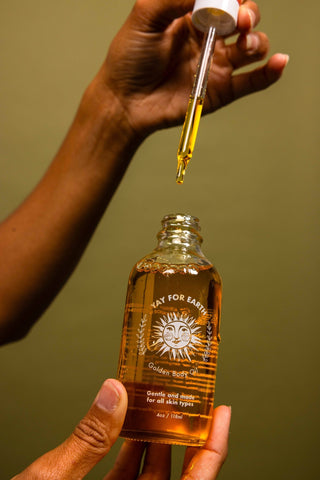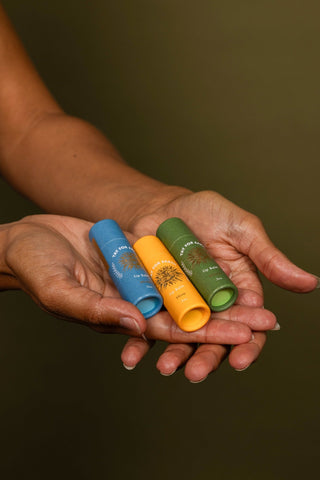Many people find themselves standing in the skincare aisle, overwhelmed by products promising "revolutionary peptides" and "breakthrough formulas" with ingredient lists that read like a chemistry textbook. Meanwhile, tucked away somewhere, there's a simple product containing beeswax – an ingredient that's been protecting and healing human skin for over 4,000 years.
What's interesting is that while we've been chasing the latest skincare trends and complicated routines, bees have been perfecting their protective formula for millions of years. Beeswax isn't just another natural ingredient – it's one of nature's most generous gifts to our skin.
If you've ever wondered whether beeswax is good for skin, this is an important question worth exploring. This isn't about going "back to basics" just because it sounds nice. It's about understanding why an ingredient that's stood the test of time continues to outperform so many modern alternatives in protecting, healing, and maintaining healthy skin while being safe enough for the most sensitive skin types.
What Exactly is Beeswax?
Before we dive into what beeswax can do for your skin, let's appreciate what you're actually working with. Beeswax is essentially the architectural foundation of a beehive – a sophisticated building material crafted by worker bees.
Worker bees produce beeswax through specialized glands in their abdomen, secreting tiny flakes that they then chew and mold to create those perfect hexagonal cells that store honey and house developing bees. This process requires enormous energy – bees must consume about 6-8 pounds of honey to produce just one pound of beeswax.
The Chemistry That Makes It Special
What makes beeswax uniquely beneficial for skin lies in its complex molecular structure. Unlike petroleum-based products that just sit on your skin's surface, beeswax contains over 300 different compounds, including esters, fatty acids, and long-chain alcohols that actually work with your skin.
The primary components include myricyl palmitate, cerotic acid, and melissic acid – compounds that provide both protective and nourishing properties. This complex composition allows beeswax to form a protective barrier while still letting your skin breathe naturally, a balance that synthetic ingredients often struggle to achieve.
Fresh vs. Processed: Why Source Matters
Not all beeswax is created equal. Fresh, minimally processed beeswax retains its natural golden color and that subtle honey-like scent that tells you beneficial compounds are still intact. Over-processing, bleaching, or excessive heating destroys much of what makes beeswax special.
Quality beeswax should have a natural golden to light brown color and a pleasant, mild aroma that speaks to its purity and potency.
The Science Behind Why Beeswax Actually Works
Barrier Function Excellence
Your skin's main job is acting as a barrier between your internal environment and the outside world. Beeswax excels at supporting this crucial function by forming an occlusive layer that prevents water loss while allowing your skin to breathe naturally.
Unlike petroleum jelly, which creates an impermeable seal, beeswax allows for proper air circulation while still providing excellent moisture retention. This breathable barrier protects without suffocating, supporting your skin's natural functions rather than shutting them down.
Moisture Retention That Actually Lasts
One of beeswax's most valuable properties is its ability to hold moisture in your skin without that heavy, greasy feeling. The molecular structure allows it to bind with water molecules and slowly release them to your skin over time.
This controlled moisture release is why beeswax-based products often provide longer-lasting hydration than water-based alternatives. You're helping your skin retain its natural moisture more effectively, creating lasting comfort rather than temporary relief.
Natural Antimicrobial Properties
Research shows that beeswax possesses natural antimicrobial properties, helping to protect skin from harmful bacteria while supporting the good bacteria. The antimicrobial effects come from propolis residues and natural alcohols present in beeswax, providing gentle protection without harsh synthetic preservatives that can disrupt your skin's natural microbiome.
Anti-Inflammatory Benefits
Beeswax contains natural anti-inflammatory compounds that help soothe irritated skin and reduce redness. These properties make it particularly beneficial for sensitive skin or conditions like eczema and dermatitis. The effects work gradually and gently, supporting your skin's natural healing processes.

Specific Skin Benefits by Type
Understanding how beeswax benefits different skin types helps explain why it's been such a universal skincare ingredient throughout history. Unlike many modern ingredients that target specific concerns, beeswax adapts to what your skin actually needs.
For Dry and Mature Skin
Dry skin lacks adequate oil production and often struggles with compromised barrier function. Beeswax addresses both issues simultaneously by providing immediate protection while supporting long-term barrier repair.
The occlusive properties are particularly beneficial for mature skin, which often becomes drier due to decreased oil production and slower cell turnover. By helping skin retain moisture more effectively, beeswax can reduce the appearance of fine lines and improve overall skin texture.
For Oily and Acne-Prone Skin
It might seem counterintuitive to add beeswax to oily skin, but understanding that beeswax is occlusive (prevents water loss) but non-comedogenic (doesn't clog pores) helps explain why it works. For oily skin, beeswax helps regulate moisture levels without adding excess oil. This regulation can actually help balance oil production over time, as properly hydrated skin doesn't need to overproduce oil to compensate for moisture loss.
For Sensitive Skin
Sensitive skin often reacts negatively to synthetic ingredients, fragrances, and preservatives commonly found in skincare products. Beeswax, being a natural single ingredient, provides effective benefits with minimal risk of irritation.
The natural composition closely mimics your skin's own protective lipids, making it highly compatible with even the most reactive skin types. At Yay for Earth, we understand this perfectly – our approach of using only trusted, organic ingredients like local beeswax in our Sensitive Skin Face Lotion means sensitive skin gets pure nutrients without harsh additives that typically trigger reactions.
For Combination Skin
Combination skin benefits from beeswax's adaptive properties. The same product can provide more protection to dry areas while allowing oily areas to function normally. This adaptability eliminates the need for multiple products targeting different zones of your face.
SHOP OUR SENSITIVE SKIN FACE LOTION WITH ORGANIC BEESWAX
Beeswax for Modern Lifestyle Challenges
Today's environment presents unique challenges for our skin that our ancestors never faced. Beeswax's protective properties make it particularly valuable for addressing these modern concerns.
Protection Against Environmental Stressors
Urban environments expose our skin to pollution, smog, and airborne particles that can penetrate and damage skin cells. Beeswax creates a breathable barrier that helps shield skin from these environmental aggressors while still allowing natural skin functions to continue.
For those who work outdoors – whether in construction, landscaping, or sports – beeswax provides essential protection against wind, sun exposure, and temperature extremes. The natural barrier helps prevent moisture loss during long exposure periods while protecting against environmental damage.
Digital Age Skin Concerns
Extended screen time exposes our skin to blue light, which emerging research suggests may contribute to skin aging and hyperpigmentation. While the research is still developing, the antioxidant compounds in quality beeswax may provide some protective benefits against this modern concern.
Mask-Related Skin Issues
The rise of mask-wearing has created new skin challenges, particularly around the mouth and chin area. Beeswax's anti-inflammatory and barrier-protective properties make it excellent for preventing and soothing mask-related irritation.
Apply a thin layer of beeswax-containing product to clean skin before putting on a mask. The protective barrier helps prevent friction and moisture buildup that can lead to breakouts and irritation.
Climate Control and Skin Health
Modern indoor environments with heating and air conditioning can dramatically affect skin moisture levels. The constant temperature and humidity fluctuations strip moisture from skin and disrupt natural barrier function.
Beeswax helps stabilize your skin's moisture levels regardless of environmental changes. Regular use creates a reservoir effect, helping your skin maintain hydration even in challenging indoor climates.

The Synergy Advantage: Beeswax in Formulations
One of beeswax's greatest strengths is how well it works in combination with other natural ingredients. Beeswax enhances the effectiveness of oils, butters, and other beneficial compounds, creating synergistic effects that deliver superior results.
This collaborative property is why thoughtfully formulated products often include beeswax as a key component. The wax acts as both a protective barrier and a delivery system, helping other beneficial ingredients penetrate more effectively while providing long-lasting benefits.
Yay for Earth understands this beautiful synergy, thoughtfully combining local beeswax with organic olive oil, shea butter, and pomegranate seed oil in our Sensitive Skin Face Lotion. Their approach shows how beeswax can work alongside other earth-given ingredients to create something truly special – no fillers, just pure nutrients working together. This combination demonstrates the power of beeswax as both a protector and enhancer, making each ingredient more effective than it would be alone.
SHOP OUR SENSITIVE SKIN FACE LOTION WITH ORGANIC BEESWAX
Application and Usage Guidelines
Understanding how to use beeswax effectively ensures you get maximum benefits while avoiding common mistakes.
Application Timeline & Techniques
- Evening routine: Apply as your final step, 30 minutes before bed
- Morning routine: Use lighter amounts if applying before sunscreen or makeup
- First-time users: Start with every other night for the first week
- Application method: Warm products between palms, then use gentle patting motions
- Focus areas: Pay special attention to areas prone to dryness – around eyes, lips, elbows
Direct vs. Formulated Products
Pure beeswax works best when warmed slightly through gentle application. For targeted areas like chapped lips or dry patches, pure beeswax provides intensive protection.
Most people find formulated products more convenient. Look for products where beeswax is combined with nourishing oils and butters for comprehensive benefits. Companies like Yay for Earth carefully balance these ingredients – their four-component approach delivers comprehensive skin benefits while remaining gentle enough for daily use on sensitive skin.
Seasonal & Frequency Adjustments
Daily use is safe and beneficial for most people. Winter requires more generous application for dry indoor heating and cold air, while summer calls for lighter application. Beeswax doesn't build up on skin, so regular use actually improves results over time.

Quality and Sourcing: What Actually Matters
Not all beeswax is created equal, and understanding quality markers helps ensure you're getting products that deliver real benefits.
Sustainable Sourcing Practices
Ethical beekeepers prioritize bee health over maximum wax production, resulting in higher-quality wax. Beeswax doesn't improve with age – fresher is better for maintaining beneficial compounds.
Processing Methods That Preserve Benefits
Minimal processing preserves the natural beneficial compounds in beeswax. Look for products that use gentle filtration methods rather than harsh chemical processing or excessive heating.
Naturally filtered beeswax retains its characteristic golden color and subtle honey scent. Over-processed or bleached beeswax loses much of what makes it beneficial for skin.
Small-Batch Production & Local Sourcing
Quality beeswax comes from healthy bee colonies managed using sustainable practices, with local sourcing indicating better quality control and fresher products. Companies that work directly with local beekeepers ensure the freshest, highest quality beeswax while supporting sustainable beekeeping practices.
Read more about how we support our local beekeepers.

Addressing Common Concerns and Myths
Several misconceptions about beeswax prevent people from experiencing its benefits. Let's address the most common concerns with evidence-based information.
"Beeswax Clogs Pores"
This is one of the most persistent myths about beeswax. Its molecular structure is too large to penetrate deep into pores, and its antimicrobial properties actually help keep pores clean.
"Beeswax Makes Skin Dependent"
Some people worry that using occlusive ingredients like beeswax will make their skin "lazy" and stop producing natural oils. This concern isn't supported by research. Beeswax supports your skin's natural barrier function rather than replacing it.
Regular use of beeswax can actually improve your skin's natural moisture retention abilities over time by maintaining a healthy barrier that functions more efficiently.
"Natural Doesn't Mean Effective"
While it's true that natural doesn't automatically mean better, beeswax is one natural ingredient with extensive research supporting its effectiveness. The complex composition of beeswax provides multiple benefits that synthetic alternatives struggle to replicate.
The key is choosing high-quality, properly processed beeswax rather than assuming all natural products are created equal.
SHOP OUR SENSITIVE SKIN FACE LOTION WITH ORGANIC BEESWAX

Integration into Your Routine
Building beeswax into your skincare routine doesn't require a complete overhaul. Understanding how to incorporate it effectively helps you get maximum benefits with minimal disruption.
Starting Simple
Begin with one beeswax-containing product and use it consistently for several weeks before adding others. This approach helps you understand how your skin responds and prevents overwhelming your routine.
Layering Considerations
Beeswax products work best when applied after water-based products but before heavier creams. Allow each product to absorb for a few minutes before applying the next layer. This timing helps prevent pilling and ensures maximum absorption.
Multi-Functional Benefits
One of the advantages of incorporating beeswax into your routine is its ability to address multiple concerns simultaneously. A quality beeswax formulation can often replace several single-purpose products, simplifying your routine while improving results.
Yay for Earth's approach demonstrates this principle beautifully – our thoughtful four-ingredient formulation for our Sensitive Skin Face Lotion provides moisturizing, anti-aging, and protective benefits in one product, eliminating the need for multiple steps while delivering superior results through synergistic, organic ingredients that work together harmoniously.
Frequently Asked Questions
Is beeswax safe for sensitive skin?
Yes, beeswax is generally excellent for sensitive skin. Its natural composition closely mimics your skin's own protective lipids, making reactions rare. The anti-inflammatory properties actually help soothe sensitive skin. However, patch testing is recommended if you have known sensitivities.
Can I use beeswax if I'm allergic to bees?
Bee allergies typically involve reactions to bee venom, not beeswax itself. However, some people may be sensitive to trace amounts of propolis or other bee products that can be present in beeswax. If you have severe bee allergies, consult with your healthcare provider before using beeswax products.
Will beeswax make my oily skin worse?
No, beeswax is non-comedogenic and can actually help balance oily skin. It provides moisture regulation without adding excess oil, which can help normalize oil production over time. Start with small amounts and monitor how your skin responds.
How often can I use beeswax products?
Most people can use beeswax products daily without any issues. Beeswax doesn't build up on skin like some synthetic ingredients, so regular use is beneficial. Start with once daily application and increase frequency if your skin responds well.
Is organic beeswax worth the extra cost?
Organic beeswax comes from hives where bees forage in areas free from pesticides and chemicals. This typically results in purer wax with better beneficial properties. For skincare use, especially on sensitive skin, organic beeswax is often worth the investment for both purity and effectiveness.
Can I use beeswax products with other active ingredients?
Yes, beeswax generally plays well with other skincare ingredients. It can actually help other beneficial ingredients absorb better and last longer on your skin. If you're using strong actives like retinoids or acids, introduce beeswax products gradually to ensure compatibility.
How long do beeswax products last?
High-quality beeswax has excellent stability and natural preservative properties. Products containing beeswax often have longer shelf lives than those without it. Properly stored beeswax products can maintain their effectiveness for 12-24 months or longer.
What's the difference between yellow and white beeswax?
Yellow beeswax is in its natural state and retains more of the beneficial compounds from the hive. White beeswax has been bleached or filtered more extensively, which can reduce some beneficial properties. For skincare purposes, yellow beeswax is generally preferred for its higher nutrient content.
Disclaimer
The information provided in this article is for educational and informational purposes only and is not intended as medical advice. Individual skin responses to beeswax and beeswax-containing products can vary significantly, and what works well for one person may not be suitable for another.
Always perform patch tests before using new skincare products, especially if you have sensitive or reactive skin. Apply a small amount of product to a discreet area and wait 24-48 hours to check for any adverse reactions before using on your face or larger areas.
If you have known allergies to bee products, honey, or other hive-related substances, consult with a healthcare provider before using beeswax products. While reactions to beeswax itself are rare, some products may contain trace amounts of other bee-related compounds.
If you experience persistent skin irritation, unusual reactions, or have specific skin conditions, consult with a dermatologist or qualified healthcare provider. This article does not replace professional medical advice, diagnosis, or treatment.
The product recommendations and brand mentions in this article are based on ingredient analysis and general skincare principles. Individual results may vary, and no guarantees are made regarding specific outcomes or timeframes for achieving results. Always follow manufacturer instructions for product use and discontinue use if irritation occurs.

